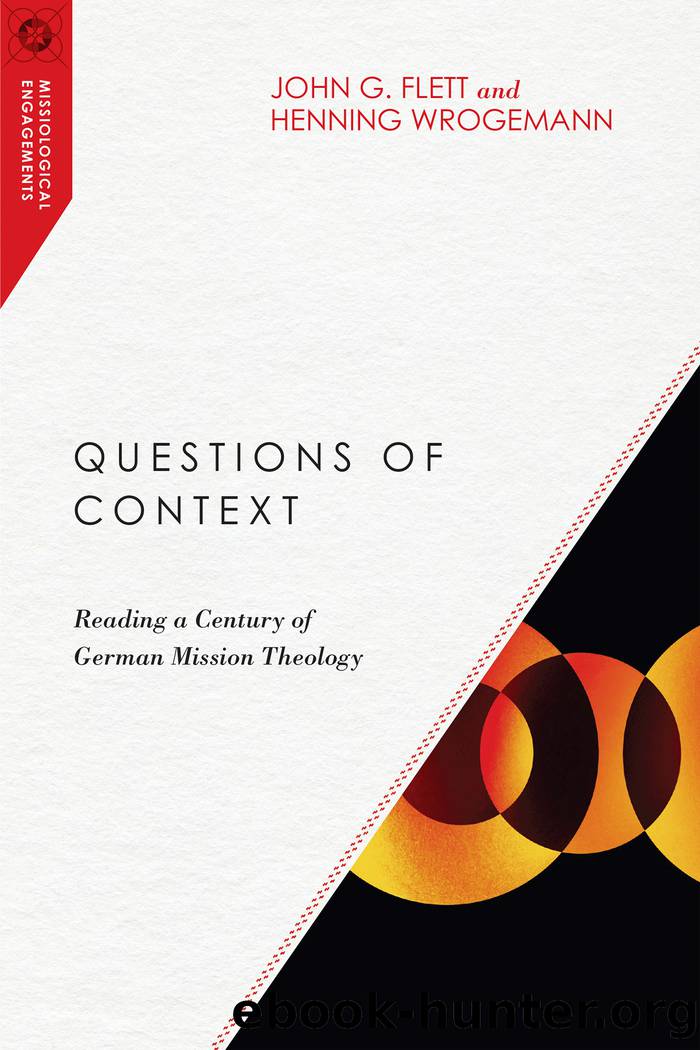Questions of Context by Flett John G.;Wrogemann Henning; & Henning Wrogemann & John G. Flett

Author:Flett, John G.;Wrogemann, Henning; & Henning Wrogemann & John G. Flett
Language: eng
Format: epub
Tags: Missiology;missiologist;missiological engagements;history of missiology;culture;intercultural;intercultural studies;intercultural theology;context;contextualization;theology;Germany;German missiology;English translation;English missiology;Karl Hartenstein;Karl Hartenstein in English;Gustav Warneck;Gustav Warneck in English;contextual hermeneutics;intercultural hermeneutics;history of contextualization;contextualizing mission
Publisher: InterVarsity Press
Published: 2020-05-29T11:49:51+00:00
2.âif it stands in relation to the unique event Jesus of Nazareth: Paul corrects the inherited myth in the direction of the cross as a historic event, and
3.âif it expresses a surplus of promise over against history, a surplus that is not easy to read from the history of reality that we have experienced.
How might the concept âchurch-for-othersâ be understood in terms of myth? With reference to the works of Secundo and Mühlen concerning communion, I understand this to be a liturgy of a mythologized âchurch-for-othersâ ecclesiology. If, according to this myth, we should celebrate the transformation of a piece of bread into a piece of flesh, then it is not a âtrue myth.â But if, according to this myth, it is about the solidarity and brotherhood of all Christians and vicariously about all human beings, then, to be sure, it is a myth, a myth that is not less âmiraculousâ and not more provable than the transformation of bread into flesh. But it is a myth that celebrates the âfunctionality of the church toward the kingdom of Godâ and forces the church âconstantly toward risk itselfâ [Selbstpreisgabe].15 The myth dismantles the barriers of our natural given sympathy or antipathy, of our political judgements and prejudices. Only a church as a church-for-others can risk its own existence again and again with such a myth of friendship. The myth contradicts our daily life experience and everything that we know about the social behavior of institutions.
Measured according to the three criteria of a âtrue myth,â the myth of âthe church-for-othersâ as it is currently celebrated in the eucharist meets only the third point. It expresses a âsurplus of promise.â It speaks about something that happens. But it does not happen here and now. Contrary to certain ecclesiological myths of the Third World, the promises of the eucharist myth as it appears in the West cannot be verified. What the myth says (the promise of the myth) and how it is said (its current incarnation in European history) appear as stark contradiction. No effort of theological astuteness, no rebuke from the eschatological tension, from the dialectic of communion and the theologia crucis, can heal this situation. The situation can only be healed, if the eucharist becomes a eucharist again, meaning a eucharist that makes the impossibleâthe church-for-othersâvisible, palpable, tangible; that means, a eucharist that does not stand in its own way by the manner of its celebration.
I have taken part in such transsocietal, transcultural, and universal eucharists. Some of them happen, for example, in Ireland, when Catholics and Protestants meet each other in a charismatic eucharist celebration and together plead for forgiveness despite the fact that they have lost some of their fathers, brothers, spouses in the civil war and will do so in the future, and despite the fact that they . . . might be ambushed on their way home. . . .
One might rightly object that all of the mentioned examples . . . are more or less located in borderline situations.
Download
This site does not store any files on its server. We only index and link to content provided by other sites. Please contact the content providers to delete copyright contents if any and email us, we'll remove relevant links or contents immediately.
Getting It, Then Getting Along by L. Reynolds Andiric(610)
Global Justice, Christology and Christian Ethics by Lisa Sowle Cahill(387)
Religion and Politics Beyond the Culture Wars : New Directions in a Divided America by Darren Dochuk(387)
Positive Psychology in Christian Perspective: Foundations, Concepts, and Applications by Charles Hackney(324)
Forgiveness and Christian Ethics by Unknown(308)
Douglas Hamp The First Six Days by Unknown(210)
Christian Martyrdom and Christian Violence by Matthew D. Lundberg;(205)
The Oxford Handbook of Greek and Roman Mythography by R. Scott Smith;Stephen M. Trzaskoma;(195)
Beyond Heaven and Earth by Gabriel Levy(188)
God and Eros by Patterson Colin;Sweeney Conor;(187)
The Bloomsbury Reader in Christian-Muslim Relations, 600-1500 by David Thomas;(186)
Insurgency, Counter-insurgency and Policing in Centre-West Mexico, 1926-1929 by Mark Lawrence(186)
The Horrors and Absurdities of Religion by Arthur Schopenhauer(183)
Autobiography, Volume 2: 1937-1960, Exile's Odyssey by Mircea Eliade(175)
Cult Trip by Anke Richter(172)
Witches: the history of a persecution by Nigel Cawthorne(171)
The Myth of Disenchantment by Jason A. Josephson-Storm(156)
An Introduction to Kierkegaard by Peter Vardy(154)
The Believer by Sarah Krasnostein(151)
